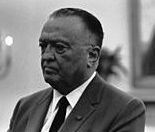A collection of documents regarding notable people within the investigations of Dr. Martin Luther King's assassination.
Ralph David Abernathy: He was born in Alabama during 1926 and worked as farmer until he was called upon to serve in WWII. Abernathy was able to secure multiple college degrees in a time when most struggled to achieve a high school education. He served as a Baptist minister, met Dr. King in 1951, and subsequently Ralph aided Martin Luther King in the organization of the Montgomery bus boycotts inspired by the arrest of Rosa Parks. Abernathy was a co-founder of multiple associations, among them was the Southern Christian Leadership Conference (SCLC). He was a close friend and confidant of Martin Luther King who led the SCLC following Dr. King's public assassination and carried out King's Poor People's Campaign. The campaign was a concern of the Central Intelligence Agency whose former employee was the only member of the Arlington Unitarian Church Board to dissent regarding support for the Poor People's Campaign and SCLC. Abernathy survived false arrests, was jailed, and he withstood both violence and intimidation from officials and racists alike for his advocacy. Yet he carried on the non-violent message and activities of Dr. King until his later retirement.
Harry George Belafonte: The legendary singer, actor, and civil rights advocate was a friend and adviser to Dr. King that began his participation during the 1950s as the Civil Rights Movement began to demonstrate and influence changes in American society. Belafonte funded the Student Nonviolent Coordinating Committee (SNCC), helped organize the historical March on Washington, and participated in several protests nationwide at Dr. King's side. The FBI investigated his funding of the SNCC and his wife's alleged relation to a member of the Communist Party was noted. Additionally, several unproven rumors about leaders of the Civil Rights Movement were cited and the Bureau seemed to entertain any speculation offered. Belafonte continued supporting international humanitarian causes for decades subsequent to his work in the Civil Rights Movement. Investigating officials eventually determined that DeLoach and the FBI had "grossly abused and exceeded its legal authority" and that Department of Justice and FBI officials "failed to investigate adequately the possibility of conspiracy in the assassination."
Cartha Dekel DeLoach: He eventually was the third most powerful official in the FBI and DeLoach had prior worked with President Lyndon Johnson in the 1950s and aided in the formation of an alliance between J. Edgar Hoover and the President while also serving as liaison to the White House. DeLoach was the Assistant Director of the FBI that supervised the Bureau's COINTELPRO anti-King campaign and led four divisions of FBI employees among them both the groups targeting Dr. King with COINTELPRO and those later investigating his assassination.
John Edgar Hoover: He was the director of the Federal Bureau of Investigation and the most powerful enemy the Civil Rights Movement faced. Unlike various officials who expressed disdain or we agitated by Dr. Martin Luther King, Hoover instead had an obsessive hatred of Dr. King and those who supported the Civil Rights Movement. Hoover masterminded the COINTELPRO program aimed at the infiltration and destruction of subversive groups. He seemingly considered the non-violent associations Dr. King founded and affiliated with equally dangerous to violent hate groups. Hoover ignored the law and executive oversight repeatedly to launch a crusade targeting Dr. King to ultimately lead to his public and personal downfall. Despite the FBI's initial claims of a lone gunman, J. Edgar Hoover in a private memo to higher and investigating officials states "we are not closing our minds that other might be associated with him (James Earl Ray) and we have to run down every lead". Unfortunately, this claim never materialized in substantive later investigation of many feasible possibilities.
James Earl Ray: He is the man officials alleged was solely responsible for the assassination of Dr. Martin Luther King despite the significant problems with the official case. While Ray is capable of having fired the shot which killed Dr. King, his other activities, lack of access to money, no verifiable practice, and a CB transmission that diverted police in pursuit of Ray during the period of his escape from Memphis contend his lone involvement. Among the many illegal methods used against Ray were the FBI intercepting messages between Ray and his attorneys and officials failed to inform him of his Miranda rights before interrogating him according to government files. Ray's later successive attorneys further attempted to financially profit from his plea of guilty that he later withdrew. Congressional officials noted the investigation came to a virtual standstill following Ray's capture.
Bayard Taylor Rustin: Rustin was an early proponent of pacifism and non-violent demonstrations and openly homosexual in a period where officials claimed those with different sexual preferences were subversive and security threats. He also was a former member of the Young Communist League and this likely attracted the hatred of rabid anti-Communist J. Edgar Hoover and the notice of the Central Intelligence Agency. Rustin later advised Dr. King as his personal secretary and later became the Secretary of the Southern Christian Leadership Conference in 1962. He was among those who organized the historic and successful March on Washington that cemented Dr. King's legacy as a significant force in American society.









